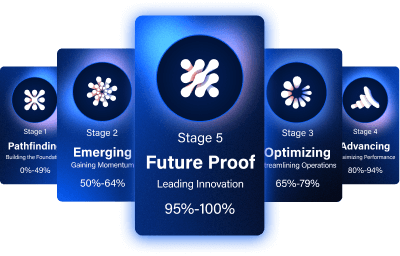Every tax season tells its own unique story. Some firms found this year particularly challenging, while others experienced their smoothest season yet thanks to implementing new technologies and streamlined processes. Whether your firm navigated unprecedented challenges or reaped the benefits of recent modernization efforts, one thing remains constant: the value of a thorough post-season debrief.
Firms that take time to analyze their tax season experiences—both positive and negative—consistently outperform those who simply move on to the next deadline. The key is conducting your tax season debrief meeting while the details are still fresh—ideally within two weeks after the deadline.
In this post, we’ll explain why a tax season debrief is essential, outline how to conduct one effectively, and provide practical tips to help you turn insights into action for next year’s tax season.
Table of Contents
- What is a Tax Season Debrief, and Why Does it Matter?
- How to Prepare for Your Tax Season Debrief
- How to Host an Effective Debrief Meeting
- How to Create a Post-Debrief Action Plan
- Tips and Reminders
What is a Tax Season Debrief, and Why Does it Matter?
A tax season debrief is a structured meeting that brings together team members to reflect on the recently completed tax season, identify what worked well, what didn’t, and create a plan for improvement.
This process matters for several key reasons:
Team Recognition and Morale
A debrief provides the perfect opportunity to acknowledge your team’s hard work and dedication during the busy season. This recognition helps maintain motivation and builds a stronger foundation for future success.
Workflow Optimization
The period following tax season offers an ideal time to evaluate and enhance your processes. Whether implementing new cloud-based accounting software or refining existing procedures, summer provides the breathing room needed to make meaningful improvements.
Professional Development
The collaborative atmosphere of a debrief creates natural opportunities for learning and growth. Senior team members can share insights while newer staff gain valuable perspective on handling various challenges.
Strategic Planning
By examining both successes and areas needing improvement, your firm can develop targeted strategies for enhanced productivity in future tax seasons.
How to Prepare for Your Tax Season Debrief
Preparation is key to a productive debrief meeting. Follow these steps to ensure you’re ready:
1. Schedule at the Right Time
Schedule your debrief meeting 7-10 days after the tax deadline while experiences are still fresh. This timing strikes the perfect balance between allowing for some mental recovery and ensuring details aren’t forgotten.
2. Distribute Comprehensive Surveys
Create and distribute detailed questionnaires to all team members before the meeting. Your survey should:
- Ask team members to evaluate whether the season was better or worse than previous years and why
- Include open-ended questions that encourage thoughtful responses
- Be anonymous to ensure candid feedback
How did this year’s tax season compare to last year’s?
10 Essential Questions to Include in Your Team Survey
Here are essential questions to include in your team survey:
- What went particularly well this busy season and why?
- What was the best improvement from last year?
- What tax processes did not go well and why?
- What technologies or applications hindered the process and why?
- What should we do better or differently this extension season?
- What areas did we have staffing shortfalls or need additional training?
- What team member went “above and beyond” or did something special?
- What client returns were awesome this year and why?
- What client engagements were difficult and why?
- Were there any unexpected challenges that emerged this season?
While these questions help you evaluate the current tax season’s performance, it’s equally important to track year-over-year progress. Reflecting on implemented changes from previous feedback cycles demonstrates your firm’s commitment to continuous improvement and shows team members that their input drives meaningful action.
In our recent industry survey, we asked firms about the changes they’ve made since last year:
What changes has your firm made since last year?
While internal team feedback drives operational improvements, there’s another critical perspective that shouldn’t be overlooked…
3. Gather Client Feedback
The ultimate measure of your firm’s success comes from those you serve. Your clients experience your processes, communication, and deliverables from a different vantage point and can identify gaps or opportunities that might not be apparent from within. By extending your feedback collection beyond your team, you gain a more complete picture of your firm’s performance.
5 Sample Questions to Ask Clients
Questions for clients might include:
- What did you like about this year’s tax process?
- What could our firm do to serve your needs better?
- How satisfied were you with our communication throughout the process?
- How easy was it to use our digital tools for document sharing?
- Would you recommend our tax services to others? Why or why not?
4. Analyze Process Documentation
Review your documented workflows and identify potential bottlenecks or areas for improvement before the meeting. Look for:
- Steps requiring manual input that could be automated
- Communication gaps between team members or departments
- Redundant processes that could be streamlined
How to Conduct an Effective Debrief Meeting
Now that you’ve prepared, here’s how to run a productive debrief meeting:
Step 1: Set the Right Tone
Begin by establishing that the purpose is improvement, not blame. Create a safe space for honest feedback by:
- Emphasizing that all input is valuable
- Acknowledging that leadership is also open to improvement
- Setting ground rules for constructive feedback
Step 2: Share Survey Results
Present the anonymized findings from your pre-meeting surveys, highlighting:
- Common themes across responses
- Areas of consensus regarding strengths and weaknesses
- Notable suggestions for improvement
Step 3: Facilitate Structured Discussion
Guide the conversation using these proven facilitation techniques:
- Ask newer staff for input first (before dominant personalities speak)
- Listen for “jokes” or “legends” that might indicate problematic processes
- Question anything tracked in spreadsheets (may indicate system shortfalls)
- Consider using a SWOT analysis (Strengths, Weaknesses, Opportunities, Threats)
- Implement “individual and group accumulation” with colored sticky notes for different categories of feedback
Step 4: Prioritize Areas for Improvement
Use a prioritization matrix to categorize identified issues based on:
- Impact (low to high)
- Implementation difficulty/technology required (low to high)
Focus first on high-impact, low-effort improvements that can deliver quick wins.
Prioritization Matrix
Step 5: Document Action Items
Ensure each identified improvement opportunity has:
- A clear owner responsible for implementation
- Specific, measurable success criteria
- Realistic timeline for completion
- Required resources identified
How to Create an Action Plan from Your Debrief
Transform your debrief insights into actionable improvements with these steps:
Step 1: Develop Timesaving Initiatives
Based on your prioritized list, create concrete strategies to reduce unnecessary administrative burden and streamline core processes:
- Implement digital data capture to reduce manual entry
- Enhance virtual collaboration tools for better team communication
- Build quality control checkpoints into each step of the tax production process
Step 2: Assess Technology Needs
Evaluate your current tools and identify potential upgrades that could enhance productivity:
- Digital workflow tools (91% adoption among successful firms)
- Document processing tools (80% using bookmarking tools, 70% utilizing OCR)
- Digital delivery systems (86% adoption of secure portals and e-signature solutions)
Step 3: Create Training Programs
Develop targeted professional development opportunities based on gaps identified during the debrief:
- Technical skills training for tax software
- Process improvement education
- Client communication best practices
Step 4: Implement Client Service Improvements
Make changes that directly enhance the client experience based on feedback:
- Streamline document collection processes
- Improve communication frequency and clarity
- Enhance digital client experience
Step 5: Establish Performance Metrics
Create measurement systems to track improvement in key areas:
- Percentage of returns delivered electronically
- E-signature usage rates
- Portal document ingress completion
- Digital engagement letter metrics
- One-and-done review rates (returns completed in single review)
- Billing and collection with completion of return
Tips and Reminders for Your Tax Season Debrief
To maximize the value of your debrief process, keep these best practices in mind:
Mix Up Your Meeting Approach
Consider different venues and formats to encourage fresh thinking:
- Walking meetings that physically trace the flow of a tax return through your office
- Offsite locations that remove team members from daily distractions
- Virtual options for remote team members
Ensure Complete Participation
Make certain every voice is heard, regardless of role or seniority:
- Aim for 100% employee participation
- Create anonymous feedback channels for sensitive issues
- Ensure remote employees receive the same consideration as in-office staff
Focus on Digital Transformation
The most successful firms are shifting from traditional metrics to measuring digital adoption:
- Track percentage of returns delivered electronically
- Monitor e-signature usage rates
- Measure portal document ingress completion
- Analyze digital engagement letter metrics
Remember the SMART Framework
Ensure all action items follow the SMART criteria:
- Specific
- Measurable
- Attainable
- Relevant
- Time-bound
Conclusion: Make This Year’s Debrief a Competitive Advantage
Conducting a thorough tax season debrief is not just a best practice—it’s a competitive advantage. By methodically assessing what worked, what didn’t, and creating an actionable plan for improvement, your firm can continuously enhance its efficiency and service quality.
The insights gained from your debrief meeting will help you implement meaningful changes that streamline processes, leverage technology effectively, and ultimately deliver better service to your clients. Remember that the most successful firms don’t just conduct these meetings—they commit to acting on the insights gained and measuring the results.
By making the debrief an integral part of your annual cycle, you’ll build a culture of continuous improvement that drives your firm’s growth and success year after year.


